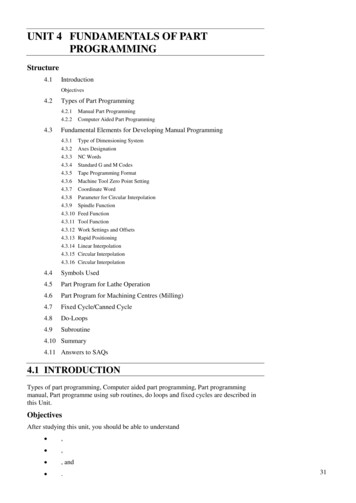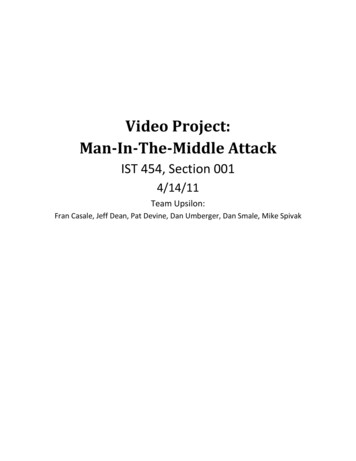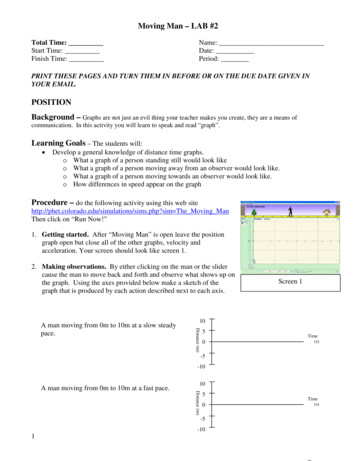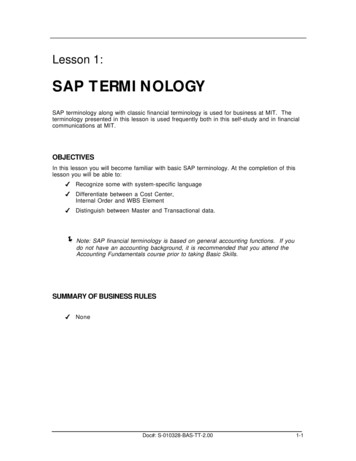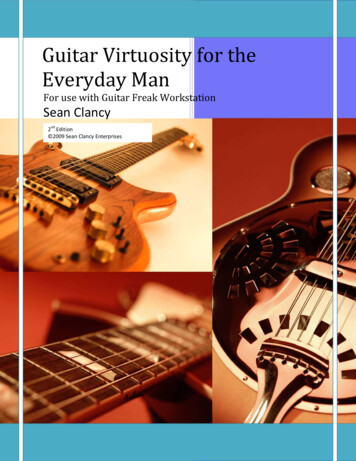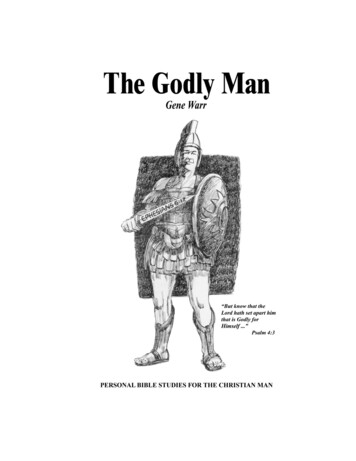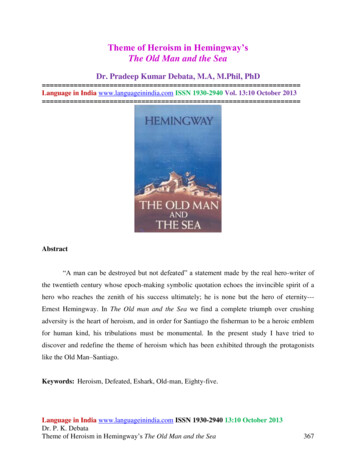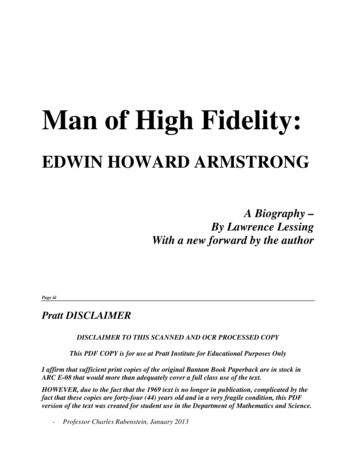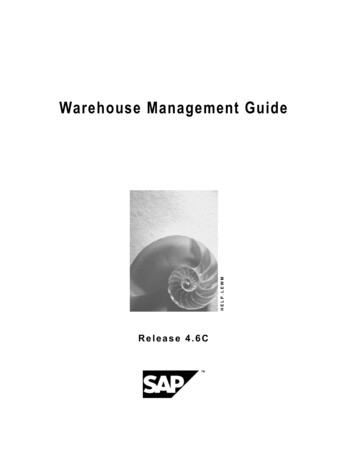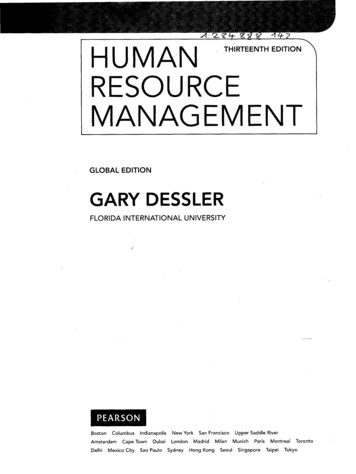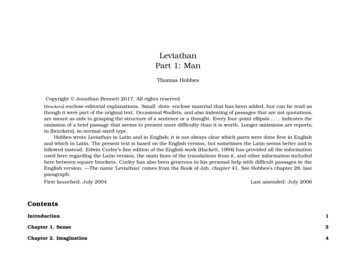
Transcription
LeviathanPart 1: ManThomas HobbesCopyright Jonathan Bennett 2017. All rights reserved[Brackets] enclose editorial explanations. Small ·dots· enclose material that has been added, but can be read asthough it were part of the original text. Occasional bullets, and also indenting of passages that are not quotations,are meant as aids to grasping the structure of a sentence or a thought. Every four-point ellipsis . . . . indicates theomission of a brief passage that seems to present more difficulty than it is worth. Longer omissions are reports,in [brackets], in normal-sized type.Hobbes wrote Leviathan in Latin and in English; it is not always clear which parts were done first in Englishand which in Latin. The present text is based on the English version, but sometimes the Latin seems better and isfollowed instead. Edwin Curley’s fine edition of the English work (Hackett, 1994) has provided all the informationused here regarding the Latin version, the main lines of the translations from it, and other information includedhere between square brackets. Curley has also been generous in his personal help with difficult passages in theEnglish version. —The name ‘Leviathan’ comes from the Book of Job, chapter 41. See Hobbes’s chapter 28, lastparagraph.First launched: July 2004Last amended: July 2006ContentsIntroduction1Chapter 1. Sense3Chapter 2. Imagination4
Leviathan 1Thomas HobbesChapter 3. The consequence or train of imaginations8Chapter 4. Speech11Chapter 5. Reason and science16Chapter 6. The interior beginnings of voluntary motions, commonly called the passions, and the speeches by whichthey are expressed21Chapter 7. The ends or resolutions of discourse28Chapter 8. The virtues commonly called intellectual, and their contrary defects30Chapter 9. The various subjects of knowledge37Chapter 10. Power, worth, dignity, honour, and worthiness38Chapter 11. The difference of manners44Chapter 12. Religion48Chapter 13. The natural condition of mankind as concerning their happiness and misery56Chapter 14. The first and second natural laws, and contracts59Chapter 15. Other laws of nature66Chapter 16. Persons, authors, and things personated74
Leviathan 1Thomas HobbesIntroductionIntroductionthe wealth and riches of all the members of the commonwealth are its strength;the people’s safety is the commonwealth’s business;advisors, by whom everything it needs to know is suggested to it, are its memory;justice is its artificial reason;laws are its artificial will;civil harmony is its health;sedition is its sickness; andcivil war is its death.Lastly, the pacts and agreements by which the parts of thisbody politic were at first made, put together, and united,resemble that fiat—that ‘Let us make man’—pronounced byGod when he was creating the world.To describe the nature of this artificial man, I will consider: ·In Part 1·: what the commonwealth is made of (men)and who made it (men). ·In Part 2·: How and through whatagreements the commonwealth is made; what are the rightsand legitimate power or authority of a sovereign; and what itis that can preserve a commonwealth and what can dissolveit. ·In Part 3·: What is a Christian commonwealth. ·In Part4·: What is the kingdom of darkness.Concerning the first topic, there is a saying that hasrecently become fashionable, thatWisdom is acquired not by reading books but byreading men.On the basis of this, people who show few other signs ofwisdom take pleasure in showing what they think they have‘read in men’—by saying nasty things about them behindtheir backs. But there is another saying—not properlyunderstood in recent times—through which men might learn[Hobbes uses ‘art’ to cover everything that involves thoughtful planning, contrivance, design, or the like.The word was often used incontrast to ‘nature’, referring to everything that happens not artificiallybut naturally, without anyone’s planning to make it happen. Hobbesopens this Introduction with a rejection of that contrast.]Nature is the art through which God made the world andstill governs it. The art of man imitates in it many ways, oneof which is its ability to make an artificial animal. Life is justa motion of limbs caused by some principal part inside thebody; so why can’t we say that all automata (engines thatmove themselves by springs and wheels as a watch does)have an artificial life? For what is the heart but a spring?What are the nerves but so many strings? What are the jointsbut so many wheels enabling the whole body to move in theway its designer intended? Art goes still further, imitatingthat rational and most excellent work of nature, man! For byart is created that great Leviathan called a ‘commonwealth’or ‘state’, which is just an artificial man—though biggerand stronger than the natural man, for whose protectionand defence it was intended. ·Here are some details of theanalogy between a commonwealth and a natural man·.The chief authority in the commonwealth is an artificial soul, giving life and motion to the whole body ·as thesoul does to the body of a natural man·;the magistrates and other officers of the law are artificial joints;reward and punishment are artificial nerves; they areconnected to the seat of the chief authority in such away that every joint and limb is moved to do his duty,as natural nerves do in the body of a natural man.1
Leviathan 1Thomas Hobbestruly to read one another, if they would take the trouble. Thesaying isNosce teipsum [Latin for ‘know yourself’]—read yourself.This has come to be used to excuse the barbarous conductof men in power towards their inferiors, or to encouragemen of low degree in disrespectful behaviour towards theirbetters. But that’s not what it was meant for. It was meant to teach us that if you are interested in the similarity ofthe thoughts and passions of one man to those of another,you should look into yourself, and consider what you dowhen you think, believe, reason, hope, fear, etc. and onwhat grounds you do so. That will enable you to ‘read’ andknow what the thoughts and passions of all other men areon similar occasions. I say the similarity of passions, whichare the same in all men—desire, fear, hope, etc.—not thesimilarity of the objects of the passions, which are the thingsdesired, feared, hoped, etc. ·There is less similarity amongthese·, because what a person wants, fears, etc. dependson his individual character and upbringing. ·The objects ofsomeone’s passions are also harder to know about, because·Introductionthey are easy for him to hide; so much so that the writing ina man’s heart (to continue with the ‘reading’ metaphor), soblotted and mixed up by dissembling, lying, faking and falsebeliefs, can be ‘read’ only by someone who can search hearts.We can sometimes learn from men’s actions what they are upto; but to do this without comparing those actions with ourown while taking into account all the relevant differences,is to decipher without a key, and to be for the most partdeceived—by too much trust or too much distrust, dependingon whether the ‘reader’ is himself a good man or a bad one.Anyway, however skilled someone is at ‘reading’ othersby their actions, that can serve him only with the few peoplehe knows personally. Someone who is to govern a wholenation must read in himself not this or that particular manbut mankind. This is hard to do, harder than learning anylanguage or science; but when I have set before you in andorderly and clear manner my own ‘reading’ ·of myself·, youwill be left only with the task of considering whether it alsoapplies to you. There is no other way to prove a doctrine ofthis kind.2
Leviathan 1Thomas Hobbes1. SensePart 1. ManChapter 1. SenseConcerning the thoughts of man, I will consider themfirst taken one at a time, and then in a sequence with onethought depending on another. Each single thought is arepresentation or appearance of some quality or feature ofa body outside us—what we call an object. Such objectswork on the eyes, ears, and other parts of a man’s body,and by working in different ways they produce differentappearances.in a sound; for the nostril, in an odour; for the tongue andpalate, in a taste; and for the rest of the body, in heat, cold,hardness, softness, and such other qualities as we detectthrough touch. All these ‘sensible’ qualities are—in the objectthat causes them—merely different motions of the matter bywhich the object presses on our organs. In us too—the oneswho are pressed—the qualities are merely various motions;for ·they are caused by motions, and· motion producesnothing but motion. But to us their appearance is fancy,the same waking as dreaming. And as pressing, rubbing,or striking the eye makes us fancy a light, and pressing theear produces a ·fancied· noise, so also the bodies that wesee or hear produce the same results through their strongthough unobserved action. ·Those colours and sounds are inus·; for if they were in the bodies or objects that causethem, they couldn’t be separated from them. We knowthey can be separated from them, because through the useof a mirror the appearance can be in one place and theobject in another; and echoes provide something similar forsounds. And though at the right distance ·and in the rightcircumstances· the actual object seems to be clothed withthe fancy that it causes in us, still the object is one thingthe image or fancy is another. So that sense in all casesis nothing but fancy that is caused by the pressure—thatis, by the motion—of external things on our eyes, ears, andother organs having that function.The source of all those appearances is what we call SENSE;for there is no conception in a man’s mind that wasn’tfirst—either as a whole, or in parts—produced through theorgans of sense.For present purposes it isn’t necessary to know what thenatural cause of sense is, and I have written about that atlength elsewhere. Still, to make my presentation complete, Iwill briefly discuss it here.The cause of sense is the external body or object whichpresses the organ proper to each sense—either immediately,as in taste and touch; or through an intermediary, as in seeing, hearing, and smelling. This pressure is passed inwards,along the nerves and other strings and membranes of thebody, to the brain and heart; there it causes a resistance,or counter-pressure, or endeavour by the heart to deliveritself [ ‘to disburden itself’, ‘to speak what is on its mind’]. Becausethis endeavour (or counter-pressure) is outward, it seemsto be some matter outside the body; and this seeming, orfancy [ ‘mental representation or image’] is what we call ‘sense’.For the eye it consists in shaped light or colour; for the ear,But the philosophy schools through all the universities ofthe Christian world, on the basis of certain texts of Aristotle’s,3
Leviathan 1Thomas Hobbesteach a different doctrine. For the cause of vision they saythat the thing that is seen sends out in all directions a visiblespecies, and that seeing the object is receiving this visiblespecies into the eye. (In English, a ‘visible species’ is a visibleshow, apparition, or aspect, or being-seen.) [Hobbes includes2. Imaginationor audible being-seen) which enters the ear and createshearing. Indeed, for the cause of understanding they say thatthe thing that is understood sends out intelligible species,that is, an intelligible being-seen, which comes into theunderstanding and makes us understand! I don’t say thisin criticism of universities; I shall come later to the topic oftheir role in a commonwealth. But on the way to that I musttake every opportunity to let you see what things would beamended in them ·if they played their proper role properly·;and one of these is the frequency of meaningless speech.‘being-seen’ on the strength of the fact that several dominant senses ofthe Latin species involve seeing. Other senses of the word don’t, butHobbes’s unkind reason for his choice will appear in a moment.] Andfor the cause of hearing they say that the thing that is heardsends forth an audible species (that is, an audible aspect,Chapter 2. Imaginationsome other motion. And so we find the schools saying thatheavy bodies fall downwards out of an appetite [ ‘desire’] forrest, and so as to conserve themselves in the place thatis most proper for them; absurdly ascribing to inanimatethings both appetite and knowledge of what is good forself-preservation—when such knowledge is more than manhas! [By ‘the schools’ Hobbes refers to universities that teach philosophyNobody doubts this:When a thing lies still, it will lie still for ever unlesssomething else moves it.But this:When a thing is in motion, it will eternally be in motionunless something else stops itis not so easily assented to, although there is the samereason for it, namely, that nothing can change itself. Thatis because men measure not only other men but allother things by themselves: because they find that aftermoving they are subject to pain and fatigue, they thinkthat everything else grows weary of motion, and of its ownaccord seeks rest. They don’t consider the possibility thatthe desire for rest that they find in themselves consists ofin a manner heavily influenced by Aristotle. The term ‘schoolmen’ refersto teachers in such universities.]When a body is once in motion, it moves for ever unlesssomething else stops it; and whatever stops it does sogradually, over a period of time; it can’t extinguish themotion in an instant. We see that when wind creates wavesin the sea, the waves keep rolling for a long time after the4
Leviathan 1Thomas Hobbeswind stops; and the same thing happens with the motionthat is made in the internal parts of a man when he sees,dreams, etc. For after the object is removed or the eyesclosed, we still retain an image of the thing we have seen,though more obscure than when we saw it. This is what theLatins call imagination, from the image made in seeing, andthey improperly apply the term to all the other senses aswell. But the Greeks call it fancy, which means ‘appearance’,and is equally proper for all the senses. So IMAGINATION isnothing but decaying sense. It is found in men and manyother living creatures, and occurs when they are sleeping aswell as when they are awake.2. Imaginationlose (for example) particular streets of cities we have seen,and particular details of events we have experienced. ·Wehave two ways of talking about· this decaying sense: when wewant to talk about the thing itself—the fancy itself—we callit ‘imagination’, as I said before: but when we want to talkabout the decay, and signify that the sense is fading, old,and past, we call it ‘memory’. So imagination and memoryare a single thing that has different names for differentpurposes.Much memory, or memory of many things, is called‘experience’. Imagination is always of things that have beenformerly perceived by sense, either all at once or by partsat several times. In the former case, imagining the wholeobject as it was presented to the senses, we have simpleimagination—as when you imagine a man or horse that youhave seen before. The other is compounded imagination, aswhen from the sight of a man at one time and of a horse atanother you conceive in your mind a centaur. So when a mancompounds the image of his own person with the image of theactions of someone else—as when a man imagines himself aHercules or an Alexander (which happens often with devotedreaders of romances)—it is a compound imagination, andstrictly speaking just a fiction of the mind. There are otherimaginations that arise in men (while they are awake) asa result of especially strong impressions made on them insensing: for example, gazing for a long time at the suncreates an image of the sun that stays before our eyes for along time afterwards; and from a long and fiercely focussedattention on geometrical figures, a waking man may when inthe dark have the images of lines and angles before his eyes.This kind of fancy has no particular name, because it is notsomething we talk about much.The imaginations that people have while asleep are whatwe call ‘dreams’. A dream, like all other imaginations, hasThe decay of sense in a person who is awake is not thedying-down of the motion made in sense. Rather, it is an obscuring of that motion, in the way the light of the sunobscures the light of the stars. In daytime just as much as atnight, stars exercise their power to make themselves visible;but among the many strokes that our eyes, ears, and otherorgans receive from external bodies only the predominantone is sensed; so when the light of the sun is predominantwe aren’t affected by the action of the stars. And when anobject is removed from our sight, the impression it made inus continues, but as it is followed by other objects that aremore present to us and that work on us, the imaginationof the past ·object· is obscured and weakened, as the voiceof a man is drowned by the noise from the street. Fromthis it follows that the longer the time is since the sight or·other· sensing of any object, the weaker is the imagination·of it·. For the continual changes in a man’s body eventuallydestroy the parts that were moved in sensing; and that iswhy distance of time has the same effect on us as distance inspace. Just as at a great spatial distance the thing we lookat appears dim, and fuzzy in its details, so also after greatdistance of time our imagination of the past is weak, and we5
Leviathan 1Thomas Hobbes2. Imagination anger, and raises up in the brain the imagination of anpreviously been in the senses, either all together as a whole orin bits. The brain and nerves, which are the necessary organsof sense, are so benumbed in sleep that they can’t easily bemoved by the action of external objects; and therefore insleep no imagination—and therefore no dream—can occurexcept as a result of the agitation of the inner parts of theperson’s body. And ·even· when these inner parts are out oforder, their connection with the brain and other organsenables them to keep these in motion, In this way theimaginations formerly made inside the man appear as ifhe were awake, except for this: the organs of sense are now(in sleep) benumbed, so that no new object can dominate andobscure the imaginations with a more vigorous impression;and so, in this silence of sense, a dream must be more clearthan are our waking thoughts. That is how it comes aboutthat it is difficult—some think impossible—to distinguishexactly between sense and dreaming. For my part, when Iconsider that in dreams I don’t often or constantly thinkof the same persons, places, objects, and actions that I dowaking; and that I don’t remember as long a sequence ofcoherent thoughts in dreams as at other times; and that when I am awake I often note the absurdity of dreams, butnever dream of the absurdities of my waking thoughts; I amwell satisfied that when I am awake I know that I am notdreaming, even though when I dream I think I am awake.enemy. Another example: just as natural kindness when weare awake causes desire, which creates heat in certain otherparts of the body, so also too much heat in those parts whilewe are asleep raises in the brain an imagination of somekindness shown. In short: our dreams are the reverse of ourwaking imaginations. The motion when we are awake startsat one end. and when we dream it starts at the other.It is hardest for a man to distinguish a dream from hiswaking thoughts when for some reason he doesn’t realizethat he has been asleep. This can easily happen to someonewho is full of fearful thoughts and has a conscience thatis much troubled, and to someone who sleeps without theperformance of undressing and going to bed—e.g. someonewho nods off in his armchair. Someone who takes troublereadying himself for sleep isn’t likely to think that any weirdlyunfamiliar fancy that comes to him is anything but a dream.We read of Marcus Brutus (who owed his life to Julius Caesar,and was his favourite, yet murdered him) how at Philippi,the night before he gave battle to Augustus Caesar, he sawa fearful apparition. Historians usually call it a vision; butconsidering the circumstances, one may easily judge it tohave been merely a short dream. For sitting in his tent,brooding and troubled with the horror of his rash act, it wasnot hard for Brutus, slumbering in the cold, to dream of whatfrightened him most; and as this fear gradually woke himup, it must also have made the apparition gradually vanish;and not knowing for sure that he had been asleep, he couldhave no reason to think it a dream, or anything but a vision.And this is not a rare occurrence; for even people who arewide awake, if they are nervous and superstitious and fullof scary stories and alone in the dark, are apt to have suchfancies and to believe they see spirits and dead men’s ghostswalking in churchyards—when really it is either their fancyAnd because dreams are caused by the disorder of someof the inner parts of the body, different disorders are boundto cause different dreams. For being cold in one’s sleepbreeds dreams of fear, and raises the thought and image ofsome fearful object (because the motion from the brain tothe inner parts is matched by an opposite motion from theinner parts to the brain). Another example: just as angercauses heat in some parts of the body when we are awake,so when we sleep the over-heating of the same parts causes6
Leviathan 1Thomas Hobbes2. ImaginationThis ·cleansing operation· ought to be the work of theschools, but instead of doing it they encourage such doctrines. Because the schoolmen don’t know what imaginationor the senses are, ·they have no defences against error inthese matters, and so· they teach what they have been taught.Some say that imaginations arise spontaneously and haveno cause; others, that they usually arise from the will,and that good thoughts are blown (inspired) into a manby God, and evil thoughts blown in by the Devil, or thatgood thoughts are poured (infused) into a man by God, andevil ones poured in by the Devil. [Hobbes is mockingly exploitingor else trickery by others making use of such superstitiousfear to pass disguised in the night to places they don’t wantto be known to frequent.This ignorance of how to distinguish dreams and otherstrong fancies from seeing and sensing is the chief source ofthe religion of the pagans of past centuries, who worshippedsatyrs, fauns, nymphs, and the like; and the source of thebelief that uneducated people have now in fairies, ghosts,and goblins, and in the power of witches. ·I include witchesin that list because· I don’t think that their witchcraft is anyreal power. Still, I think they are justly punished for theirfalse belief that they can do such mischief, together withtheir intention of doing harm if they can; so that their tradeis nearer to a being a new religion than to being a craft orscience. As for fairies and walking ghosts, I think the beliefin them has deliberately been taught (or not challenged) soas to keep people believing in the use of exorcism, of crosses,of holy water, and other such inventions of ghostly men [here ‘religious men’, a joke usage].No doubt God can make unnatural apparitions; but itis not an article of the Christian faith that he does this sooften that men should fear such things more than they feara stoppage of, or change in, the course of nature—eitherof which God can also bring about. But ·claims aboutthe frequency of divinely sent apparitions are still made,because· evil men, under pretext that God can do anything,are impudently willing to say anything when it suits theirpurposes, even if they think it untrue. A wise man will believethem no further than right reason makes what they say seemcredible. Men would be much more fitted than they are forcivil obedience if this superstitious fear of spirits were gotrid of, and with it future-reading based on dreams, falseprophecies, and many other effects of such superstition bywhich crafty ambitious men abuse simple people.the fact that ‘inspire’ and ‘infuse’ come from Latin meaning ‘breathe in’Some say that the senses receivethe ‘species’ of things and pass them on to the ‘commonsense’, thence to the imagination, to the memory, to thejudgment—like passing things from hand to hand, with manywords making nothing understood. [For ‘species’ see the lastand ‘pour in’ respectively.]paragraph of chapter 1; ‘common sense’ is a supposed organ or facultywhich, according to Aristotle, integrates the materials provided by thefive specialized senses.]The imagination that is raised in man (or any othercreature capable of imagining) by words or other voluntarysigns is what we generally call understanding. It is commonto man and beast; for a dog will through custom come tounderstand the call, or the scolding, of his master, andso will many other beasts. ·That, however, involves onlyunderstanding what his master wants·. The understandingthat is special to man ·and not shared with the beasts· isthe understanding not only of what others want but alsoof what they think and believe; and this understanding isbased on the how sequences of names of things into arewoven together into affirmations, negations, and other formsof speech. I shall discuss this kind of understanding later.7
Leviathan 1Thomas Hobbes3. The train of imaginationsChapter 3. The consequence or train of imaginationsBy ‘consequence of thoughts’ or ‘TRAIN of thoughts’ I meanthe occurrence of thoughts, one at a time, in a sequence; wecall this ‘mental discourse’, to distinguish it from discoursein words.the sequence of thoughts is not governed by any passionatethought which could direct the whole sequence towards somechosen end; and the thoughts are said to ‘wander’, and seemirrelevant to one another, as in a dream. Men often havethoughts like this when they are alone and not absorbedin any cares; their thoughts are still as busy as at othertimes, but there is no harmony to them—like the sound ofan untuned lute or of a tuned one played by an incompetent.Yet in this untamed roaming of the mind we can still oftensee what is going on, and grasp how one thought dependson another. For in a discussion about England’s presentcivil war, what could seem more irrelevant than to ask, assomeone did, What was the value of a Roman penny? But Isaw its relevance plainly enough: the thought of the warintroduced the thought of the delivering up of the king to hisenemies, which brought in the thought of the delivering upof Christ, which led to the thought of the 30 pennies [‘thirtypieces of silver’] which was the price of that betrayal; and fromthat the malicious question ·about the value of a Romanpenny· easily followed. All this happened in a moment oftime, for thought is quick.When a man thinks about something, what his nextthought will be is not quite as accidental a matter as itseems to be. It isn’t the case that any thought is as likely asany other to follow a given thought. On the contrary: just aswe never have an imagination that hasn’t previously beenpresented to us—as a whole or in parts—by our senses,so we never have a transition from one imagination toanother that is unlike any transition we have had in oursenses. Here is why. All fancies are motions inside us,left-overs from the motions made in sensing; and whenone motion is immediately followed by another in sensing,that sequence of motions also continues after the sensingis over, because when the former motion again occurs andpredominates, the latter motion follows, by coherence of thematter moved [Hobbes’s exact phrase]. ·A familiar example of thesame phenomenon·: When water is pooled on a flat surface,and you draw some of it in one direction with your finger,the rest of the water follows. However, a thing perceivedby the senses will be followed sometimes by one thing andsometimes by another, so that in due course ·there cometo be rival candidates for the role of follower of a givenimagination·. Thus, when someone imagines something,there is no certainty about what he will imagine next; but itis certain that it will be something that followed the other atone or another earlier time.The second ·sort of train of thoughts· is more constant,being regulated by some desire, and some design. Theimpression made by things that we desire or fear is strongand permanent, or if it stops for a time it comes back quickly.It is sometimes so strong that it keeps us awake at night,or interrupts our sleep. From desire arises the thoughtof some means that we have seen produce something likewhat we aim at; and from that comes the thought of meansto those means, and so on, continually, until we come tosome beginning that is within our own power. What weThis train of thoughts, or mental discourse, is of two sorts.The first is unguided, unplanned, and inconstant. In this8
Leviathan 1Thomas Hobbesare aiming at—our end—makes a strong impression andso comes often to mind, so that if our thoughts begin towander they are quickly brought back into line ·by thisstrong and frequently-present impression of the end·. It washis knowledge of this that led one of the seven wise men togive his followers the injunction (now a cliché) Respice finem[Latin, ‘look to the end’]; that is to say, in all your actions keepan eye on what you are aiming at, letting your view of thatdirect all your thoughts about how to achieve it.3. The train of imaginationsreminiscentia, as it were scanning again our former actions.Sometimes a man knows a definite place within which hehas to search; and then his thoughts run over all the partsof it, in the way one would sweep a room to find a jewel, oras a spaniel runs all over a field till he picks up a scent, oras a man might run through the alphabet to make a rhyme.Sometimes a man wants to know the outcome of anaction; and then he thinks back to some earlier action ofthe same kind, and the sequence of its outcomes, supposingsimilar outcomes will follow similar actions. For exa
Leviathan 1 Thomas Hobbes Introduction truly to read one another, if they would take the trouble. The saying is Nosce teipsum [Latin for ‘know yourself’]—read yourself. This has come to be used to excuse the barbarous conduct of men in power towards their inferiors, or to encourage m
